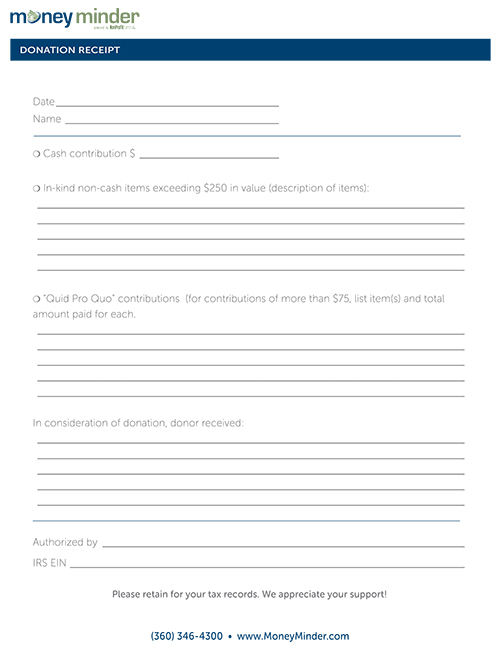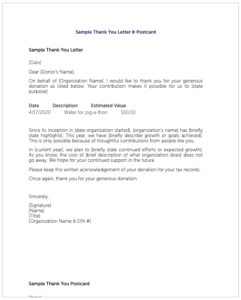 For the charitable groups that MoneyMinder serves — Parent Groups, Booster Clubs, Sports Teams, Scouts, Churches, Social and Service Nonprofits — donations are a major driver of success. After all, the support and services you provide to people come at a monetary cost. The more donations you receive, the more support and services you can provide.
For the charitable groups that MoneyMinder serves — Parent Groups, Booster Clubs, Sports Teams, Scouts, Churches, Social and Service Nonprofits — donations are a major driver of success. After all, the support and services you provide to people come at a monetary cost. The more donations you receive, the more support and services you can provide.
And while your organization does have an obligation to provide donation receipts, the way you do it can generate even more donations! So, we have created this post to help you understand everything about nonprofit donation receipts so that you can appropriately acknowledge the donations you receive.
WHAT is a donation?
In its simplest form, a donation is something that is given to a nonprofit group or charity. While this gift from the donor to donee is often monetary, it can also take other forms.
WHAT different types of donations are there?
There are two basic types of donations: cash and in-kind. Cash Donations come in the form of cash, check or credit cards. In contrast, In-Kind Donations encompass everything else — from hard goods to real estate, stocks and bonds.
WHAT is a donation receipt?
A donation receipt serves as a written acknowledgment that a donation was made to your group.
WHY should I provide a donation receipt?
First off, for legal reasons. Donors must have a bank record or written communication from a charity before they can claim a contribution on their federal income tax returns.
Second, it’s the first step in thanking your donors and encouraging more long-term affiliation with your group. Let us be clear, all that is required is the donation receipt. But going the extra mile with a heartfelt thank you letter that shows how their contribution helps and makes them feel part of your group? Priceless.
WHO gets a donation receipt?
According to the most recent (Rev. 3-2016) IRS Publication 1771:
Donors are responsible for obtaining a written acknowledgment from a charity for any single contribution of $250 or more before the donors can claim a charitable contribution on their federal income tax returns.
Charitable organizations are required to provide a written disclosure to a donor who receives goods or services in exchange for a single payment in excess of $75.
WHEN should a donation receipt be sent?
Although legally you must send the donation receipt by January 31 of the year after the donation was made, it’s very common for donors to receive a receipt immediately or very soon after their gift.
HOW should a donation receipt be sent?
There are many different ways to get this job done, and they range from handwritten notes to email and good old-fashioned snail mail.
WHAT should be included in a donation receipt?
There are a few basics that must be included in your donation receipt per the IRS:
- The name of your donor
- The full legal name of your organization
- A declaration of your organization’s tax-exempt status
- Your organization’s employer identification number
- The date the gift was received
- A description of the gift and the amount received
- Any exchanges your organization provided in receipt of the donation
Note that it is not necessary to provide any identification such as the donor’s Social Security Number or Tax Identification number.
HOW can I go above and beyond for my donors?
As mentioned above, the donation receipt is just the starting point for thanking your wonderful donors for helping your organization. Download MoneyMinder’s full suite of sample thank you forms and letters, the starting point for any nonprofit treasurer. For your convenience, we’ve also included the thank you letter and postcard here for easy reference.
Making Donation Management Easier
You can make the donations process much easier by utilizing MoneyMinder accounting software. This program has a “Donations” feature that tracks cash donations and allows you to create statements and send “Thank You” letters right out of the program. Specifically designed with nonprofit organizations in mind, MoneyMinder can save you money and time, so that you can spend more on what really matters.


 Connect your Venmo account to MoneyMinder PRO to directly download transactions, saving you time and effort. You just review the transactions to ensure they are properly categorized and fill out any required fields.
Connect your Venmo account to MoneyMinder PRO to directly download transactions, saving you time and effort. You just review the transactions to ensure they are properly categorized and fill out any required fields. Connect your Bank, Paypal and Square accounts to MoneyMinder PRO to directly download transactions, saving you time and effort. You just review the transactions to ensure they are properly categorized and fill out any required fields.
Connect your Bank, Paypal and Square accounts to MoneyMinder PRO to directly download transactions, saving you time and effort. You just review the transactions to ensure they are properly categorized and fill out any required fields. Connect your Bank, Paypal and Square accounts to MoneyMinder PRO to directly download transactions, saving you time and effort. You just review the transactions to ensure they are properly categorized and fill out any required fields.
Connect your Bank, Paypal and Square accounts to MoneyMinder PRO to directly download transactions, saving you time and effort. You just review the transactions to ensure they are properly categorized and fill out any required fields. Join It is a membership management service that helps businesses and nonprofits effectively sell, track, and grow their membership.
Join It is a membership management service that helps businesses and nonprofits effectively sell, track, and grow their membership. Connect your Bank, Square and PayPal accounts to MoneyMinder PRO to directly download transactions, saving you time and effort. You just review the transactions to ensure they are properly categorized and fill out any required fields.
Connect your Bank, Square and PayPal accounts to MoneyMinder PRO to directly download transactions, saving you time and effort. You just review the transactions to ensure they are properly categorized and fill out any required fields.
Can I get an annual giving receipt please.
Hi Bill,
The organization you donated to will be the one to give you a donation receipt. I would suggest contacting them.